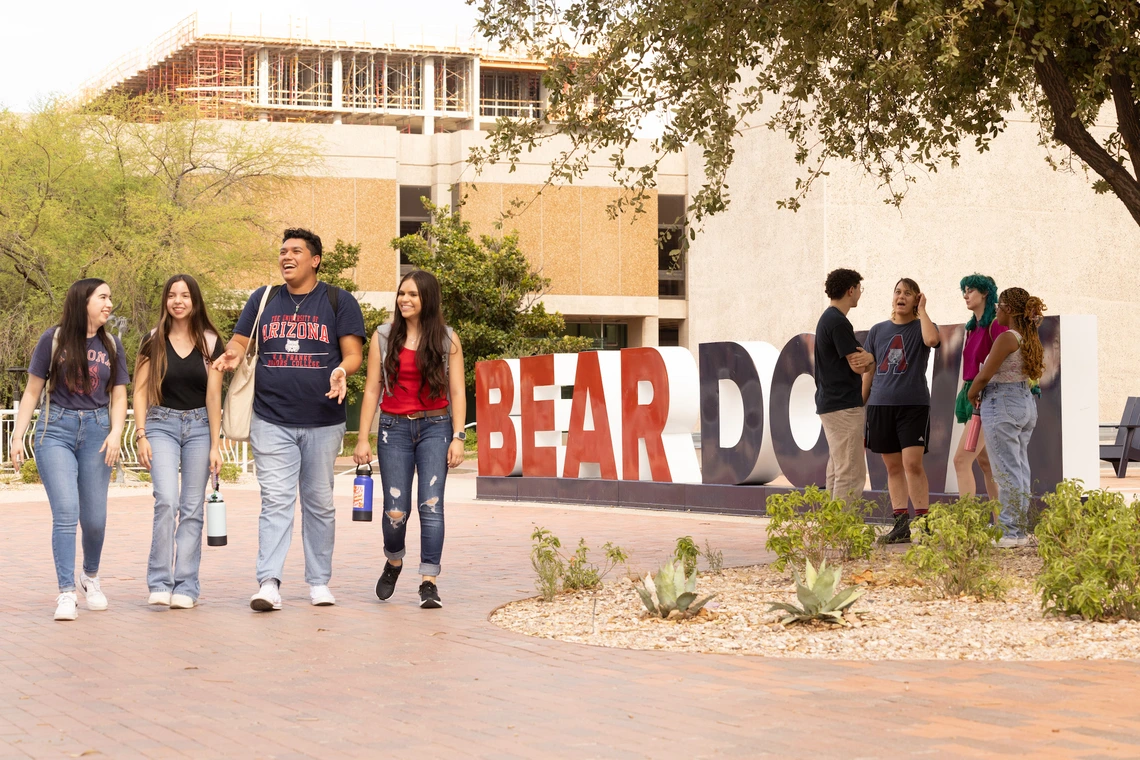University of Arizona is again recognized for its service to Latino students

The University of Arizona is among the first institutions in America to earn the new Intentionally Thriving Institution designation of the Seal of Excelencia, Excelencia in Education announced today.
Seal of Excelencia-certified institutions produce outsized impact on student outcomes, representing less than 1% of all colleges and universities in the U.S., yet enrolling 16% and graduating 18% of Latino students nationwide, as well as enrolling 7% and graduating 8% of all students.
"The seal is a rigorous, data-driven certification, not an award or ranking," said Deborah Santiago, co-founder and CEO of Excelencia in Education. "The University of Arizona earned the seal by going beyond enrollment to intentionally support Latino, and all students in their pursuit of success. Through its collaboration with Excelencia, the U of A is cultivating the next generation of leaders who will strengthen our workforce and enrich our society."
The university was designated as a Hispanic-Serving Institution by the U.S. Department of Education in 2018 in recognition of its success in enrolling Hispanic students and in the educational opportunities it provides them. The university's enrollment this year includes 14,140 students who identify as Hispanic or Latino – more than a quarter of the total enrollment.
The university was one of nine universities to receive the inaugural Seal of Excelencia in 2019, and it was recertified in 2022. This year's seal designates the university as an "Intentionally Thriving Institution," which only seven other universities have also earned.
"The recertification for our Seal of Excelencia and Intentionally Thriving Institution designation honors and celebrates the outcomes of our commitment to student success," said Marla Franco, special advisor for Hispanic-Serving Institution initiatives in the U of A Office of the Provost. "This is the result of an intentional, university-wide, continuous journey to ensure students feel supported during their time on campus with the resources they need to excel."
The Seal of Excelencia recognizes the U of A's excellence in enrolling, retaining and providing financial support for students, helping connect them with the workforce after college, and representing Latinos in administration, faculty and staff. The seal also recognizes that the university has intentionally implemented programs and policies that help continue that success.
The U of A's six-year graduation rate among Hispanic or Latino students has risen steadily, from 59.8% in 2021 to 65.8% in 2025. The three-year retention rate among Hispanic and Latino U of A students has also increased, from 63.3% to 71.5%, over the last seven years.
"This recertification affirms that student success is at the heart of everything we do at the U of A," said Patricia Prelock, provost and chief academic officer. "As a land-grant institution, we are called to ensure that every student has the opportunity to thrive. To be recognized as an 'Intentionally Thriving Institution' underscores the progress we've made and the promise we hold, to empower Hispanic and Latino students, and all students, to turn their aspirations into achievements that will strengthen our communities."
The university runs a host of programs aimed at strengthening the way the university serves Hispanic student enrollment, retention and overall success. The university's Enrollment Management team hosts an annual Arizona Experience for prospective students and families and runs campus tours in Spanish. Other programs, such as Upward Bound and Project Outreach FAMILIA, help ensure students are academically prepared for college through partnerships with high schools.
Another program, called CIELO, allows students to take short-term trips, domestically and abroad, to better understand other cultures. Past CIELO trips have explored Puerto Rico and the Dominican Republic, Mexico, tribal communities in Northern Arizona and more.
Key financial aid support includes scholarships such as the U of A Hispanic Alumni Club's First-Year Tuition Scholarship, which provides up to $4,000 per academic year. UAHA Scholars have a retention rate of 95% compared to their peers who are not scholarship recipients.
The university also offers programs and resources to ensure Latino and Hispanic students complete their degree programs. The Student Success and Retention Innovation team develops strategies specifically aimed at addressing the needs of Hispanic and Latino students, including financial considerations that keep many students from re-enrolling in new semesters, Franco said. And the U of A Thrive Center's First-Year Peer Mentoring program helps students build community so they can excel during their time on campus.
To support students after they graduate, the university's Student Engagement and Career Development team provides programs that help students find internships and prepare for careers. The vast majority of students who use SECD programs – 87% – report in surveys that the support added value to their degree.
The university also hosts an annual Bilingual Initiatives Symposium, which convenes U of A experts to explore bilingualism in education and how to foster multicultural understanding across campus.
The university also hosts the AZ HSI Consortium, bringing together leaders from all Hispanic-Serving Institutions in Arizona to strengthen their individual and collective capacity to intentionally support Hispanic student success.
Aimée Chavez, who has earned bachelor's and master's degrees and is now pursuing a doctoral degree in higher education at the University of Arizona, spoke about the value of these investments.
"Working with HSI Initiatives definitely influenced my decision to go to graduate school," Chavez said. "I was very fortunate to be surrounded by amazing, powerful women who were supportive during my application process and who continue to serve as mentors I look up to today. Through this experience, I discovered the concept of servingness, focusing on what students need and how we can address those needs to ensure they are able to persist throughout their higher education journeys."


